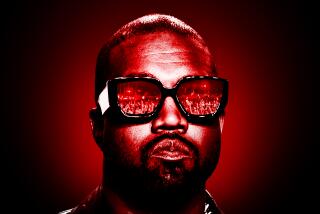Reggae stars still stir up activists
- Share via
No upcoming concert in Los Angeles is stirring up passions more than the Century Club appearance Tuesday by Buju Banton and Beenie Man, two Jamaican stars who are viewed by fans as icons of the island’s musical uplift but also reviled by the gay activist community as anthem singers for bigotry.
The Century show is a fall-back booking for headliner Banton -- he had been scheduled to play at the Highlands but the management there changed plans in response to a campaign led by local black gays and lesbians.
For the record:
12:00 a.m. Sept. 30, 2006 For The Record
Los Angeles Times Saturday September 30, 2006 Home Edition Main News Part A Page 2 National Desk 1 inches; 44 words Type of Material: Correction
Reggae concerts: An article in Friday’s Calendar section about controversial reggae musicians Buju Banton and Beenie Man said they would perform on the same bill Tuesday at the Century Club. In fact, they will appear separately, Banton on Tuesday, Beenie Man on Oct. 22.
“I didn’t know the history,” Adam Manacker, the general manager for the Highlands, said the day he scrapped the show. “We felt it was the right thing to do after doing some research on the matter.”
History, its echoes and the shelf life of hate music are the intriguing subplots in any of Banton’s tour dates these days.
The product of slums in Kingston became a sensation in Jamaica in the early 1990s (he even topped Bob Marley’s record for most No. 1 hits in a year in the country) when his sound was a gruff, bombastic style of dancehall music. Today, he is a reggae singer of the more traditional mold and cites a Rastafarian religious awakening for the evolution of his sound from raunchy dance grind to an earthier spiritual bounce.
All of that, though, is overshadowed by one Banton hit song: “Boom Bye Bye.”
The 1992 track became an instant and lasting anthem for the entrenched anti-gay attitudes found in much of his native island. The song describes shooting gays in the head and pouring acid on them. Some of the lyrics: Dis is not a deal/Guy come near we/Then his skin must peel/ Burn him up bad like an old tire wheel. (Beenie Man has his own notoriety for a song that has imagery about hanging lesbians with a long piece of rope.)
Jamie Koz, of Jamaican Gold, the show’s promoter, said in a statement that Banton’s firebrand past is just that -- the past. “Buju has already apologized for his actions back in 1992 when the incident was first addressed.... Buju’s music no longer reflects any sort of anti-gay lyrics. His music is spiritual and positive. And that is the vibe that we present at Jamaican Gold.”
But the activists who succeeded in pulling down the Highlands show (and also helped to do the same with a Banton show planned for Saturday in Oakland) dismiss the musician’s discussion of spiritual renaissance and have won sympathy from venue managers by sending them video of Banton singing a portion of “Boom Bye Bye” in Miami four months ago.
Jasmyne Cannick, a founder of the National Black Justice Coalition and one of the point-people in the campaign to protest Banton’s bookings in Los Angeles, said Banton simultaneously presents himself as enlightened and distanced from his past while performing his notorious old anthem.
“I fully understand the right of artists to express themselves, but I cannot sit in silence when blatantly homophobic recording artists come to Los Angeles to perform,” said Cannick, who added that the situation is especially volatile considering strained relations between parts of the local black and gay communities. “I’m black and I’m lesbian and it’s been a difficult situation with this show.”
Difficult and complicated, according to Tracii MacGregor, a spokeswoman for Banton, who said the singer is being unfairly savaged for lyrical statements made years ago and long before he stepped up to his current role as a humanistic artist. And what about that video from Florida? She said the 45 seconds of grainy footage, which is on youtube.com, ends abruptly for a reason. It was a song fragment that was followed by a free-style commentary on Banton’s public life as protest target.
“Juicy stuff ... but alas, context is everything,” MacGregor said. “Buju has not actually performed ‘Boom Bye Bye’ in years. He has, however, railed off the first couple of lines of the song as a springboard to discuss with fans the ongoing troubles he’s been faced with over that one song for these last 15 years. It’s a pity the camera phone didn’t catch all that in Miami.”
Adding to the swirl of accusation and acrimony is the fact that Banton was tried and acquitted in his native country on charges that he participated in the beating of six gay men by a Kingston gang in the summer of 2004. The singer has described it as a wild fiction and witch-hunt taken to the extreme; his protesters call it further evidence of his true heart.
Either way, it adds to the ongoing backbeat of a musical life that, right or wrong, cannot be separated from rhythms of prejudice.
More to Read
The biggest entertainment stories
Get our big stories about Hollywood, film, television, music, arts, culture and more right in your inbox as soon as they publish.
You may occasionally receive promotional content from the Los Angeles Times.









